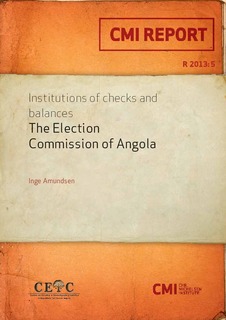Institutions of checks and balances: The Election Commission of Angola
Research report
Permanent lenke
http://hdl.handle.net/11250/2475155Utgivelsesdato
2013-08-01Metadata
Vis full innførselSamlinger
- Publications [1488]
Originalversjon
Bergen: Chr. Michelsen Institute (CMI Report R 2013:5) 34 p.Sammendrag
This report focuses on one particular institution which may mitigate the centralisation of power in Angola and pave the way for political reform and democratisation; the Angolan national electoral commission (the Comissão Nacional Eleitoral, CNE). The study outlines the types and role of governmental electoral management bodies (EMBs), positions the CNE in a comparative historical perspective, and analyses the CNE’s mandate and independence in terms of legal autonomy, nomination of leaders/commissioners, and financial autonomy. It is argued that the CNE is in constitutional and legal terms a genuinely independent commission, with a comparatively broad mandate and powers. However, due to the political context of Angola it remains to be seen if this formal autonomy will be translated into a counter-balancing institution to the centralised Angolan government.
